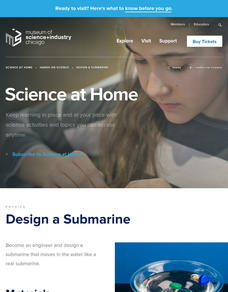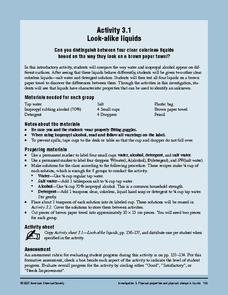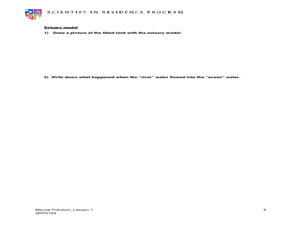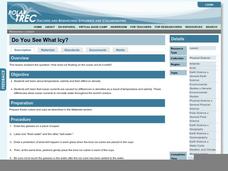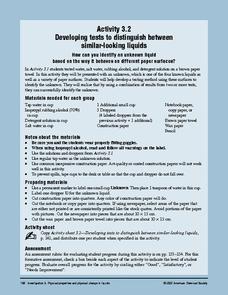Virginia Department of Education
States of Matter
Scientists have been studying exothermic reactions before they were cool. The lesson begins with a discussion and a demonstration of heat curves. Scholars then determine the heat of fusion of ice and the heat needed to boil water through...
Chymist
Batteries
Young scientists study the construction of a battery through experimentation. They engage in five experiments which combine to create a thorough study of the history of batteries beginning with a model of the first battery.
Curated OER
Salty Sea Water
Learners conduct an experiment to find out if there is salt in the ocean. In this scientific inquiry lesson, students pour a cup of salt water onto an aluminum plate and observe the changes over a few days. Learners complete an included...
Museum of Science
Design a Submarine
Don't just sink the boat. Using a closed container as a submarine, pupils experiment to see what to add to the container to make it float, sink to the bottom, and hover in the middle. After finding one option, learners see if they can...
Curated OER
The Floating Golf Ball
Learners explore density by floating golf balls. They explore having their golf balls float halfway in a container of water and discuss density and its realtionship to where the golf balls are floating. After adding food coloring, they...
PBS
Ocean Circulation in the North Atlantic
Swirling and churning, the waters of the North Atlantic play a vital role in Earth's climate! Discover the many factors that produce circulation using a multimedia lesson from PBS's Weather and Climate series for high schoolers. Scholars...
Curated OER
Salinity Experiment
In this salinity experiment worksheet, students follow the procedures to set up an experiment about how salinity affects the weight of water.
Curated OER
Algae Experiments
Students describe the characteristics of algae. In this biology lesson, students perform a series of experiment to explore algae. They investigate the basic things algae need to survive.
Curated OER
Osmosis Investigation
High schoolers investigate osmosis as they determine how carrot cells respond to two different environments. They conduct the experiment, record the data, and answer discussion questions.
Curated OER
Surface Water and Groundwater
Students examine distribution of water and minerals. In this surface and groundwater lesson, students conduct an experiment with fresh and salt water making hypothesis and drawing conclusions about minerals.
American Chemical Society
Look-Alike Liquids
Here is the first of four experiments to differentiate among unknown liquids by their behaviors and properties. Pupils observe how different liquids respond to being placed on plastic and paper, and they take notes about their...
Curated OER
MEASURING THE DENSITY OF WATER
Students perform an experiment to measure the density of tap water vs. salt water.
Teach Engineering
Solar Power
Elementary schoolers discover how engineers use solar energy to heat buildings. They take a close look at some of the materials used: sand, salt, water, and shredded paper and evaluate the efficiency of each material. An incredible...
Curated OER
Lesson Plan #3 ~ Ocean Currents
Sixth graders experiment to understand the ocean's currents. In this ocean current lesson, 6th graders complete an experiment with two bottles of water and an index card to discover information about the ocean current. Students...
Curated OER
Modeling Estuaries
Students create a model estuary. In this modeling estuaries lesson, students identify characteristics and mix water of varying densities. Students form a hypothesis, conduct an experiment, and analyze the results.
American Chemical Society
Chromatography - Color Clues
Here's an activity that will change how one sees color. Pupils try out an experiment on chromatography where they place a drop of food coloring on a coffee filter, add several drops of water, and watch the colors spread and separate....
Curated OER
Sea Water Freeze
Students observe how salinity affects the time it takes water to freeze. They participate in an experiment to determine that ice is essentially salt-free whether formed from fresh or salt water
Polar Trec
Do You See What Icy?
Here is a lesson that kicks off with a question. "How does ice floating on the ocean act as it melts?" As learners investigate this natural phenomenon, they'll discover that it has a lot to do with temperature, salinity, and the effect...
Teach Engineering
The Keepers of the Gate Challenge
Help your class make a connection between salt water and nanoscience. In the introductory lesson of a seven-part unit, the class explores why salt water helps a sore throat feel better. Pupils conduct preliminary research about the...
American Chemical Society
Developing Tests to Distinguish Between Similar-Looking Liquids
Each group talks about how to test unknown liquids based on their findings in the previous experiment. In this second of four activities, they test unknowns on wax paper, newspaper, and construction paper. As a stand-alone, this lesson...
Virginia Department of Education
Aspirin Analysis
Laughter may be the best medicine, but aspirin is also important. Young chemists analyze aspirin tablets using titration in this lab experiment. They then repeat the entire experiment using a different aspirin brand.
Curated OER
What Are The Properties of Sea Water?
Ninth graders conduct research on the subject of sea water. They use a variety of resources to obtain information. There are helpful resource links listed in the lesson. In conjunction with the research students make inquiry of the...
San Francisco Public Utilities Commission
Water from the Well
How much water does it take to brush your teeth? How about to wash your clothes? Perform an experiment that measures water usage in everyday tasks and compares them to the days before indoor plumbing, specifically the California gold...
EduGAINs
Understanding Viscosity through Investigation and Comparison of Fluids
Not all liquids are the same. Investigate the viscosity of different fluids with a series of activities designed for eighth grade science. As learners move through learning centers with different experiment setups, they determine the...





